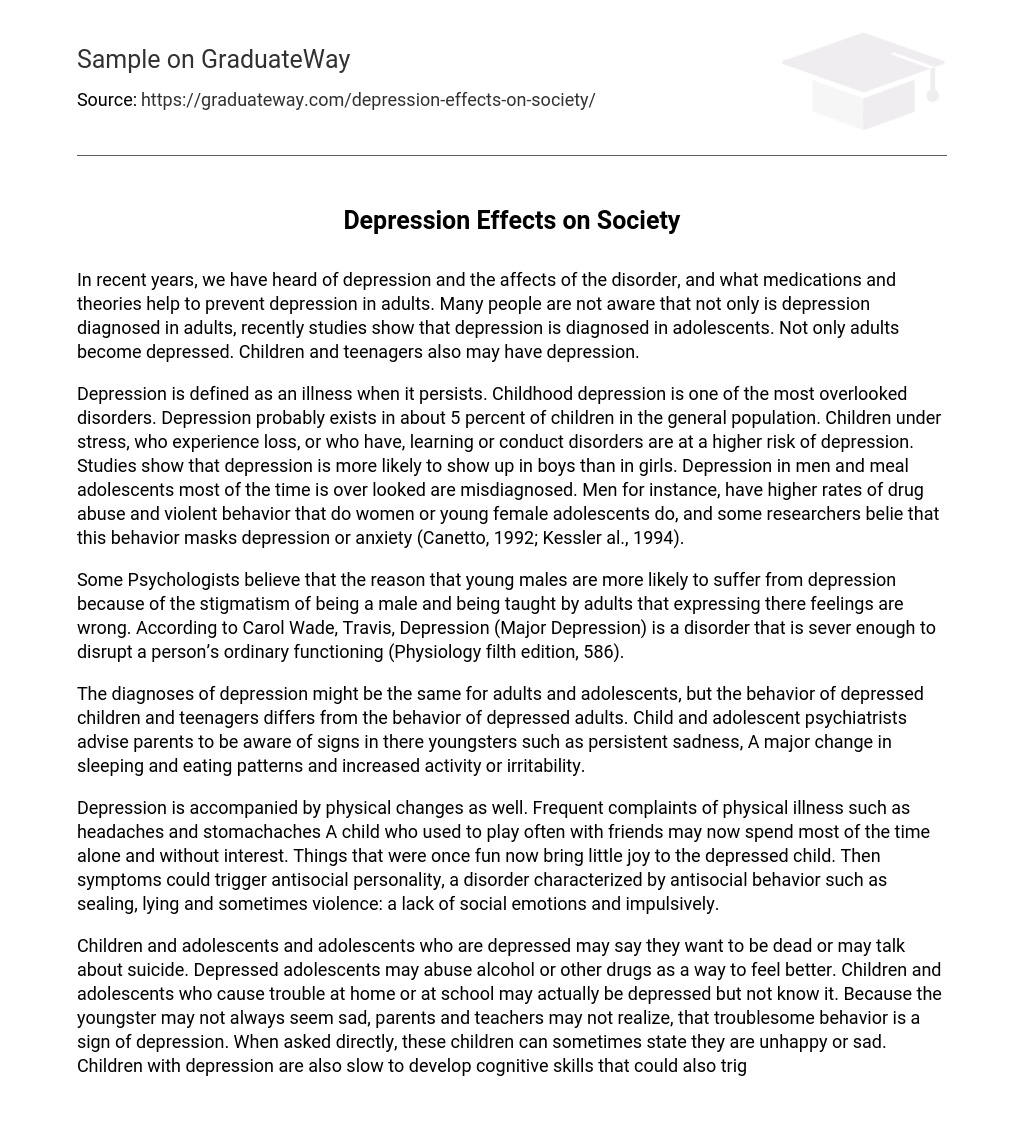As our knowledge of depression improves, we are increasingly recognizing its importance and influence on people. This includes both adults and adolescents who are now acknowledged as being vulnerable to depression. It is crucial to acknowledge that depression can impact individuals across all age groups, including children and teenagers.
Childhood depression is a condition that is often overlooked and affects around 5 percent of children in the general population. Children who experience stress, loss, or have learning/conduct disorders are at a higher risk of developing depression. Research suggests that males are more vulnerable to depression than females, particularly among adolescents where it can go unnoticed or be misdiagnosed. Additionally, men have higher rates of drug abuse and violent behavior compared to young female adolescents or women. Some researchers believe that these behaviors may be masking underlying anxiety or depression (Canetto, 1992; Kessler et al., 1994).
Psychologists believe that young males are more prone to depression due to societal stigma against masculinity and the misconception that showing emotions is not acceptable. In her book “Physiology” (5th edition, 586), Carol Wade defines depression as a serious condition that can interfere with an individual’s normal functioning.
According to child and adolescent psychiatrists, depression symptoms can be similar in adults and adolescents. However, the behavior displayed by depressed individuals may differ depending on their age group. Therefore, parents should stay alert for signs of depression in their children. These signs include persistent sadness, noticeable changes in sleeping and eating patterns, increased activity levels, or irritability.
The physical manifestations of depression may encompass recurring headaches and stomachaches. Furthermore, it can induce a child’s inclination to isolate themselves, lose enthusiasm for formerly pleasurable pursuits, and favor solitude. These indications have the potential to contribute towards the emergence of antisocial personality disorder which is distinguished by actions like theft, dishonesty, and sporadic aggression. This disorder is linked with an absence of social emotions and impulsive behaviors.
Children and adolescents who are depressed may express thoughts of wanting to die or discuss suicide. Some depressed teenagers might use alcohol or drugs as a way to cope. It is possible that children and teens who display disruptive behavior at home or school could actually be experiencing depression, even if they are unaware of it. Because these individuals may not always appear sad, parents and teachers may not recognize their troublesome behavior as a symptom of depression. In some cases, when asked directly, these children may admit to feeling unhappy or sad. Furthermore, depressed children might also experience delays in cognitive development, which can further contribute to their feelings of frustration.
Mothers are being associated with child depression.
Recent research indicates that depression can be inherited from mothers to their children, especially if the mothers have experienced depression before or after giving birth. Additionally, offspring in single-parent households are more likely to inherit symptoms and behaviors associated with depression. Teenagers who are depressed may face additional challenges such as verbal abuse, separation anxiety, panic attacks, and substance abuse. Furthermore, recent studies suggest a genetic component to mental disorders like depression. It is not uncommon for adults who have suffered from depression to have at least one child struggling with the same condition. Some cases of maternal depression may also be influenced by social factors. The higher prevalence of depression among women could be attributed to their increased likelihood of encountering adversity and having unsatisfactory relationships.
For 15 years, psychologists have studied the occurrence of bipolar disorder in children and found that it can be difficult to identify this disorder in young children. Bipolar disorder, also known as manic depression, is different from depression. In teenagers, symptoms of bipolar disorder manifest as a euphoric state referred to as mania.
Teenagers who experience depression may exhibit an abnormal state of excitement called mania. This can be seen in their low self-esteem, while those with bipolar disorder may have an inflated sense of self-worth. In addition to these symptoms, adolescents with bipolar disorder often show excessive energy and a strong desire for success. They also tend to be intelligent, outspoken, humorous, highly sociable, and talkative.





